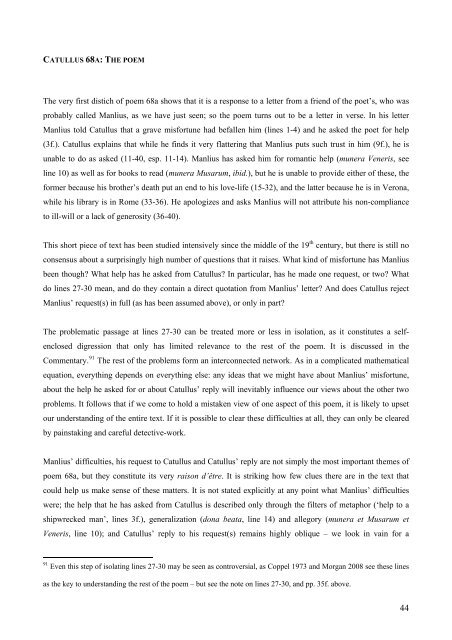CATULLUS 68 - Scuola Normale Superiore
CATULLUS 68 - Scuola Normale Superiore
CATULLUS 68 - Scuola Normale Superiore
Create successful ePaper yourself
Turn your PDF publications into a flip-book with our unique Google optimized e-Paper software.
<strong>CATULLUS</strong> <strong>68</strong>A: THE POEM<br />
The very first distich of poem <strong>68</strong>a shows that it is a response to a letter from a friend of the poet’s, who was<br />
probably called Manlius, as we have just seen; so the poem turns out to be a letter in verse. In his letter<br />
Manlius told Catullus that a grave misfortune had befallen him (lines 1-4) and he asked the poet for help<br />
(3f.). Catullus explains that while he finds it very flattering that Manlius puts such trust in him (9f.), he is<br />
unable to do as asked (11-40, esp. 11-14). Manlius has asked him for romantic help (munera Veneris, see<br />
line 10) as well as for books to read (munera Musarum, ibid.), but he is unable to provide either of these, the<br />
former because his brother’s death put an end to his love-life (15-32), and the latter because he is in Verona,<br />
while his library is in Rome (33-36). He apologizes and asks Manlius will not attribute his non-compliance<br />
to ill-will or a lack of generosity (36-40).<br />
This short piece of text has been studied intensively since the middle of the 19 th century, but there is still no<br />
consensus about a surprisingly high number of questions that it raises. What kind of misfortune has Manlius<br />
been though? What help has he asked from Catullus? In particular, has he made one request, or two? What<br />
do lines 27-30 mean, and do they contain a direct quotation from Manlius’ letter? And does Catullus reject<br />
Manlius’ request(s) in full (as has been assumed above), or only in part?<br />
The problematic passage at lines 27-30 can be treated more or less in isolation, as it constitutes a selfenclosed<br />
digression that only has limited relevance to the rest of the poem. It is discussed in the<br />
Commentary. 91 The rest of the problems form an interconnected network. As in a complicated mathematical<br />
equation, everything depends on everything else: any ideas that we might have about Manlius’ misfortune,<br />
about the help he asked for or about Catullus’ reply will inevitably influence our views about the other two<br />
problems. It follows that if we come to hold a mistaken view of one aspect of this poem, it is likely to upset<br />
our understanding of the entire text. If it is possible to clear these difficulties at all, they can only be cleared<br />
by painstaking and careful detective-work.<br />
Manlius’ difficulties, his request to Catullus and Catullus’ reply are not simply the most important themes of<br />
poem <strong>68</strong>a, but they constitute its very raison d’être. It is striking how few clues there are in the text that<br />
could help us make sense of these matters. It is not stated explicitly at any point what Manlius’ difficulties<br />
were; the help that he has asked from Catullus is described only through the filters of metaphor (‘help to a<br />
shipwrecked man’, lines 3f.), generalization (dona beata, line 14) and allegory (munera et Musarum et<br />
Veneris, line 10); and Catullus’ reply to his request(s) remains highly oblique – we look in vain for a<br />
91 Even this step of isolating lines 27-30 may be seen as controversial, as Coppel 1973 and Morgan 2008 see these lines<br />
as the key to understanding the rest of the poem – but see the note on lines 27-30, and pp. 35f. above.<br />
44






